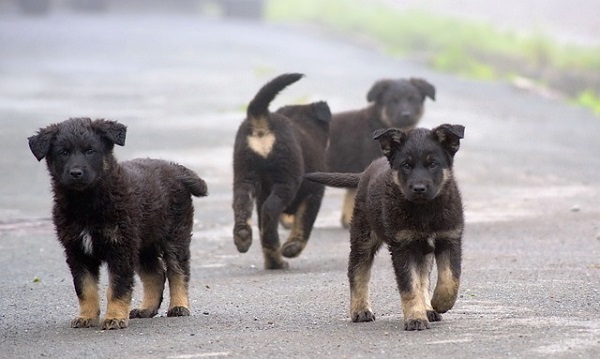 Credit: Pixabay
Credit: Pixabay
I grew up in Bucharest, Romania, and was often scared of the dogs living on the streets. Not all of them were aggressive or even necessarily interested in interacting, some were friendly and lovely but did not have a caring family or home waiting for them.
The cute, beige-brown puppies I first discovered coming back from school one day grew into playful dogs who would bark at certain passersby. They would sometimes form packs that made it difficult to walk around unbothered or move too fast in certain areas, lest they run after you. They were a constant presence, but nobody called the pound, because of the likelihood for them to be trapped and get euthanised. This was, in fact, the case until 2017.
Most often, the stray dogs problem was a live-and-let-live situation, with kind neighbours feeding the breastfeeding mothers and their puppies, or leaving out blankets and boxes out for them. As the puppies turned into bigger, grown-up dogs that ran wild and occasionally acted territorial, sympathy sometimes grew scarcer. Some shooed them, some still fed them and left out boxes for them, but because of their semi-wild state most people avoided getting too close.
After I moved to Luxembourg, on one of my holidays back in 2013, I heard a rumour that a pack of stray dogs had attacked and killed a four-year-old child in Bucharest, which truly shocked me and made me realise to what point this live-and-let-live was actually unacceptable. I had never been bitten by a stray dog, I was only scared on them because I was little and they were often unpredictable. I understood that animal control in Romania was a never-ending vicious cycle. While the local association responsible for stray animal control and care was more often than not accused of not showing up and picking up the animals that were signalled to them, the problem never went away.
The numbers of stray animals that could make loving pets if given the chance is truly heartbreaking. Developing in difficult conditions, with scarce food and aggression around, diseases and injuries going unchecked can turn friendly, lovely dogs into dangerous or highly sensitive ones who need specific care and conditions to thrive. This is also an issue in other European countries, such as Spain and Greece.
Fortunately, there are a number of non-profit organisations in Luxembourg who specialise in pet adoption from abroad, thereby contributing to rescuing good dogs that could become dangerous if living in stressful, rough conditions. A few of them are, notably: DogAdopt Luxembourg, Live Love Adopt Luxembourg, Lucky Souls Luxembourg Asbl and the Anima Pro Terra organisation. Such non-profit organisations honestly advertise the pets available for adoption, detailing their personality, struggles and ideal owner profiles. The organisations carefully select forever homes for the dogs rescued from Romania (and other EU countries, such as Spain) and ensure the dogs are healthy and with their papers in order before they reunite them with new owners. Safe transportation of the pets is assured, and the new family will usually get a “trial period” to see if they and their new pet are a good match for each other. The organisation representatives check in with the new owners and do home visits to ensure the household is able to optimally care for the new family member. In some cases, they can also offer some extra support with training and behavioural advice. Some even check in later and create group meetings for the pet owners to meet each other and stay in touch.
Ruth Lorang, who got her beloved four-legged companion, Milou, from Romania, through the Anima Pro Terra organisation, told me she was “very satisfied” with the process. Although the procedure of “shopping for a dog online without meeting her” seemed really strange to her at first, she was impressed with the level of care the organisation put in making sure her and her partner were able to care for the dog. Because Ruth wanted to make sure she, her partner and the new dog would be a good match, they signed up as a foster family first. Once having met the dog, however, and being with her for 24 hours, Ruth said they agreed “we’re not giving her back.” She also praised the organisation’s engagement in not “leaving the new dog owners alone”. Ruth stressed that stray dogs who lived in the streets are often traumatised. Milou herself had had puppies before Ruth adopted her and bore traces of having been harmed. “There were certain reactions I was not used to, things one must know how to handle. At the beginning I found her unpredictable, and when she had a ‘crisis’ I felt insecure.” The organisation swiftly recommended a dog psychologist who was able to reassure Ruth and give tips and tricks on how to handle trickier situations.
Similarly, Sandy Heep described the process with the non-profit organisation Lucky Souls as very reliable. She was looking for a not-too-large dog, preferably not a puppy, and when she found Manny, it was “love at first sight” for her. When the family who initially applied to adopt him decided against a mixed-breed dog, she applied for a three-week trial period. After the first week, she realised they “clicked perfectly.” Manny came into the country will all his papers and a passport, he still needed to get a few vaccinations done. Sandy emphasised the risks of adopting a dog who used to be a stray: she was aware that it takes patience and time and there may be trauma to overcome and take into account. Although the adoption cost itself was only around €350 (Manny came chipped, neutered, etc.), Sandy stressed the need for financial flexibility when it comes to pets. Despite her and her family’s initial reluctance and doubts about adopting a stray dog from Romania, Sandy said “it couldn’t have been better” for her and Manny, who proved to be a highly sociable and friendly companion.
Stray dogs left unattended, running wild, can undoubtedly pose a danger to society. However, when being taken care of by capable, animal-loving organisations and patient, welcoming people, anxious and unpredictable stray dogs can turn into loving and loyal companions for life. The potential challenges very often lead to fulfilling results and a delightful human-pet bond.










